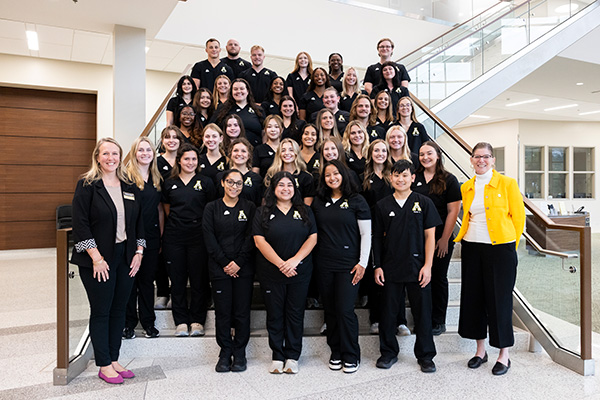BOONE, N.C. — Exploring and explaining rural-serving higher education institutions and the roles they play regionally across the U.S. is the focus of the Alliance for Research on Regional Colleges (ARRC), co-directed and co-founded by App State’s Dr. Andrew Koricich.
As a research collaborative and resource hub, ARRC’s four co-directors aim to build research infrastructure, produce data-driven analysis and educate a range of audiences about the role of regional, or rural-serving, institutions. Graduate students at ARRC’s partner institutions will serve as research assistants for the alliance’s projects.
Koricich, an associate professor of higher education in the Reich College of Education’s Department of Leadership and Educational Studies, said this hub’s contributions are important because regional colleges “play a transformative role in rural communities across the country by providing educational opportunity, workforce development and economic impact to areas with so much untapped human potential.”
ARRC’s first report, published Jan. 26 on the ARRC website, examines the status of public colleges in rural communities during the COVID-19 pandemic and recommends actions federal policymakers can take to support these institutions — both during and after the COVID crisis. The second report, currently underway, aims to develop an evidence-based, research-backed definition for rural-serving institutions.
The reports align with ARRC’s five focus areas:
- Generating a greater understanding of rural-serving higher education institutions through research.
- Documenting contributions of regional colleges to individuals and communities.
- Defining what it means to be a regional or rural-serving college.
- Advocating for regional colleges and the communities they serve.
- Analyzing policies, practices and pressing issues in the public interest.
The ARRC project is supported by grant funding and has received more than half-million dollars to date from nonprofit organizations Ascendium Education Group and The Joyce Foundation.
Examining COVID threats and defining ‘rural-serving’
For its first report highlighting the importance of rural-serving institutions and the challenges they face due to COVID-19, the ARRC team examined 118 rural public colleges in 39 states across the U.S. — including App State — that foster access to college, support local economies, address critical workforce shortages and contribute to public health infrastructure.
Among the team’s major findings:
- Rural public colleges are important partners in building public health infrastructure and battling COVID-19 in rural communities. These colleges have responded to the COVID-19 challenge by providing community members with access to testing and helping to disseminate public health information on vaccines, the report highlights.
- Rural public colleges are underfunded, relative to other public colleges, and need more financial support to serve their communities through COVID-19 and beyond. As a result of revenue losses due to COVID — losses representing nearly 10% of institutions’ total budget, at times — many colleges have cut spending, meaning reduced hours for hourly workers, employee furloughs, vacant positions remaining unfilled and worker lay-offs, the report states.
- Rural public colleges, which are often the largest employers in their communities, sustain local economies and fuel community development. On average, these colleges employ more than 500 people, not including third-party contractors, according to the report. Nearly half of schools included in the report host a business or technology development center to aid local businesses and 64% house a museum, contributing to the cultural preservation of rural populations.
-
Through their graduates, these colleges address worker shortages in high-demand local industries, including teaching and nursing. According to the report, “… top degrees awarded by rural public colleges align with major industries in rural communities, including education, health professions, business, hospitality and tourism, and natural resource management.”
In addition to defining rural-serving institutions through its second report, the ARRC team will create a range of data products and interactive and customizable data tools to promote research about these institutions. These resources will be made publicly available on the ARRC website.
“We are excited about the potential this definition will have to build capacity and infrastructure for research on these institutions, establish peer networks between rural-serving institutions, inform policymaking and guide philanthropy,” Koricich shared.
What do you think?
Share your feedback on this story.
About the Department of Leadership and Educational Studies
The Department of Leadership and Educational Studies at Appalachian State University prepares traditional and nontraditional students to assume educational leadership roles in community colleges, universities, public schools, public libraries and related educational settings through active scholarship, reflection, professional discourse and interdisciplinary programs of study based on the integration of theory and practice. The department, housed in App State's Reich College of Education, offers a doctoral program in educational leadership, as well as support courses in educational foundations and research. Learn more at https://les.appstate.edu.
About the Reich College of Education
Appalachian State University offers one of the largest undergraduate teacher preparation programs in North Carolina, graduating about 500 teachers a year. The Reich College of Education enrolls more than 2,000 students in its bachelor’s, master’s, education specialist and doctoral degree programs, with offerings that span multiple fields — from teacher preparation, counseling, and therapy, to higher education, school and student affairs administration, library science, educational leadership and more. With over 10,000 alumni employed in North Carolina public schools, there is at least one Reich College graduate in every county in the state. Learn more at https://rcoe.appstate.edu.
About Appalachian State University
As a premier public institution, Appalachian State University prepares students to lead purposeful lives. App State is one of 17 campuses in the University of North Carolina System, with a national reputation for innovative teaching and opening access to a high-quality, cost-effective education. The university enrolls more than 21,000 students, has a low student-to-faculty ratio and offers more than 150 undergraduate and 80 graduate majors at its Boone and Hickory campuses and through App State Online. Learn more at https://www.appstate.edu.













